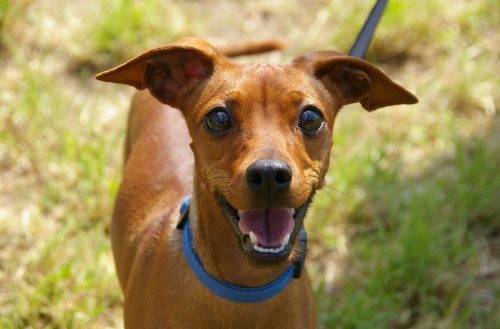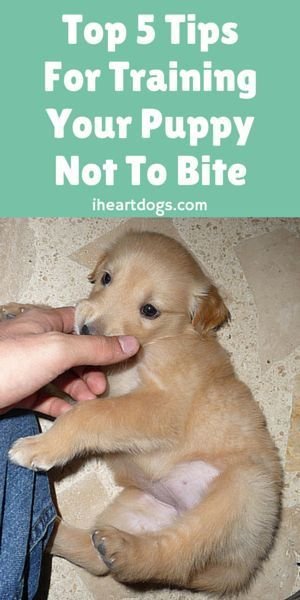To train your puppy not to bite, create consistent boundaries, reinforce good behavior, and provide a designated space for your puppy. Avoid physically punishing your puppy or yelling at them, as this can escalate the behavior.
Instead, redirect their attention to a tug toy or chew toy when they start biting and praise them when they engage with it. This process may take time and practice, but it is important to be patient and consistent.

Credit: www.animalbliss.com
Understanding Puppy Biting
When it comes to training your puppy, one of the most important behaviors to address is biting. Puppies naturally use their mouths to explore the world and learn, but it’s essential to teach them that biting is not acceptable. In this section, we will dive into why puppies bite and the importance of addressing this behavior. By understanding the reasons behind puppy biting, you can effectively train your furry friend to have gentle and appropriate mouth behaviors.
Why Do Puppies Bite?
Puppies bite for several reasons, and understanding these motivations will help you tackle the issue effectively. Here are some common reasons why puppies bite:
- Teething: Puppies go through a teething phase, where their new teeth are coming in and causing discomfort. As a result, they may bite to relieve the pain and itchiness.
- Exploration: Puppies use their mouths to investigate their surroundings, much like how a human baby uses their hands. They may chew or bite objects to learn about their texture, taste, and even to relieve boredom.
- Play and socialization: Puppies often play rough with their littermates, using their mouths during play sessions. This behavior is a normal part of their development, but it’s crucial to teach them appropriate play biting boundaries.
- Fear or discomfort: If a puppy feels scared or uncomfortable in a particular situation, they may resort to biting as a way to defend themselves.
The Importance Of Addressing Puppy Biting
Addressing puppy biting is essential for several reasons. Not only will it prevent potential injuries to you, your family, and others, but it will also establish boundaries for your puppy’s future behavior. Additionally, teaching your puppy not to bite will promote positive social interactions and ensure your furry friend grows up to be a well-behaved and trusted companion.

Credit: www.kurgo.com
Establishing Consistent Boundaries
To train your puppy not to bite, establishing consistent boundaries is crucial. This can be achieved by creating clear rules, reinforcing good behavior, and providing a designated space for your puppy to play and relax. By doing so, you can effectively teach your puppy appropriate biting habits.
Creating A Safe And Appropriate Environment
One of the first steps in establishing consistent boundaries when training your puppy not to bite is to create a safe and appropriate environment for them. This means making sure your puppy has a designated space where they can feel secure and comfortable. Set up a crate or a specific area in your home that is their own, filled with toys, a cozy bed, and water. This will help teach them where they can go to relax and play, instead of resorting to biting out of boredom or stress.Setting Consistent Rules And Consequences
Another important aspect of establishing consistent boundaries when training your puppy not to bite is setting clear rules and consequences. Consistency is key here. Make sure everyone in your household is on the same page when it comes to what behavior is acceptable and what is not. For example, if your puppy bites during playtime, immediately redirect their attention to a chew toy or a ball. By doing this consistently, your puppy will start to associate biting with an unpleasant consequence, and they will eventually learn that it is not acceptable behavior.Ensuring Consistency In Reinforcement And Rewards
Consistency extends beyond just setting rules and consequences. When training your puppy not to bite, it’s crucial to be consistent in your reinforcement and rewards as well. Use positive reinforcement techniques, such as praise and treats, to reward your puppy when they exhibit good behavior. This will motivate them to continue behaving appropriately. However, be mindful that the rewards are given consistently and only for the desired behavior. Inconsistency in reinforcement can confuse your puppy and make it harder for them to understand what is expected of them.Using Redirecting Techniques
Redirecting your puppy’s biting behavior to more appropriate alternatives is another effective way to establish consistent boundaries. Whenever your puppy starts to bite, gently but firmly redirect their attention to a chew toy or a bone. This will teach them that biting on appropriate objects is acceptable, while biting on people or objects that are not meant for chewing is not. Consistently redirecting their biting urges will help them develop the habit of seeking appropriate outlets for their teething needs.Establishing A Routine For Exercise And Mental Stimulation
Lastly, establishing a routine for exercise and mental stimulation can help prevent your puppy from resorting to biting out of boredom or excess energy. Puppies, especially certain breeds, have high exercise and mental stimulation needs. Make sure to provide them with regular playtime, walks, and brain-engaging activities to keep them physically and mentally stimulated. A tired puppy is less likely to exhibit excessive biting behavior. By following these tips and remaining consistent in your approach, you can effectively establish boundaries when training your puppy not to bite. Remember, patience and consistency are key in teaching your puppy appropriate behavior, and with time and effort, they will learn to control their biting instincts.Positive Reinforcement Training
Looking for tips on how to train your puppy not to bite? Positive reinforcement training methods, such as redirecting their attention to toys or treats, can help teach your puppy appropriate behaviors and discourage biting. Consistency and patience are key in teaching your furry friend to play gentler and interact with humans without nipping.
Using Rewards And Treats Effectively
One effective method of positive reinforcement training for puppies is using rewards and treats. Puppies are naturally eager to please and will respond well to rewards for good behavior. When your puppy displays appropriate behavior, such as not biting, promptly reward them with treats. This positive reinforcement technique helps them associate good behavior with rewards, encouraging them to continue to exhibit the desired behavior.
Teaching Bite Inhibition
Bite inhibition is an essential skill for puppies to learn. It involves teaching them to control the force of their bites and to minimize causing harm when playing or interacting with others. One effective method to teach bite inhibition is through socialization with other puppies or well-behaved adult dogs. During play, the other dogs will help correct the puppy if their biting becomes too rough. Additionally, make sure to provide appropriate chew toys for your puppy to redirect their biting urges. This way, they learn to recognize the difference between acceptable and unacceptable biting.
Redirecting To Appropriate Chew Toys
Redirecting your puppy to appropriate chew toys is an important part of training them not to bite. Puppies have a natural instinct to chew, especially during teething. By providing them with a variety of chew toys, you offer them an alternative to biting people or furniture. Whenever you catch your puppy biting something they shouldn’t, calmly redirect their attention to a suitable chew toy. Over time, they will learn what is acceptable to bite and what is not.
Ensuring Consistency And Patience
Consistency and patience are key when training your puppy not to bite. It’s important to establish consistent rules and boundaries from the beginning. Everyone in the household should use the same training methods and enforce them consistently. Additionally, keep in mind that training takes time and puppies may not grasp the concept immediately. Be patient with them and praise their progress along the way. With consistent training and positive reinforcement, your puppy will learn not to bite.
Seeking Professional Help
If you’re struggling to train your puppy not to bite, don’t hesitate to seek professional help. A qualified dog trainer or behaviorist can provide expert guidance tailored to your puppy’s specific needs. They can observe your puppy’s behavior and offer personalized strategies to address biting. Professional assistance can greatly speed up the training process and ensure that your puppy develops appropriate bite inhibition skills.
Handling Aggressive Biting
Aggressive biting can be a frustrating and concerning behavior in puppies. It is essential to address this issue promptly to ensure the safety of everyone involved and prevent future problems.
Recognizing Signs Of Aggression
It is crucial to be able to recognize the signs of aggression in your puppy. Some common signs include growling, showing teeth, snarling, lunging, or biting forcefully. Understanding these signs will help you respond appropriately and prevent any potential harm.
Seeking Professional Help
If your puppy’s aggressive biting behavior persists or worsens despite your efforts, it may be beneficial to seek professional help from a qualified dog trainer or behaviorist. They have the expertise and experience to assess the situation and provide appropriate guidance and training techniques.
Using Training Aids Such As A House-line Or Crate
Training aids such as a house-line or crate can be useful tools when dealing with aggressive biting. A house-line, which is a lightweight leash attached to your puppy’s collar, allows you to have better control during training sessions. It enables you to guide and redirect your pup’s behavior effectively.
A crate, on the other hand, can provide a safe and secure space for both you and your puppy. It helps manage the biting behavior by giving your pup a designated area where they can calm down and relax. Additionally, proper crate training can help establish boundaries and promote positive behavior.
TIP: When using a crate, ensure it is appropriately sized for your puppy, comfortable, and includes enticing toys or treats to make it a welcoming space.
Consistency Is Key
In addressing aggressive biting, consistency is paramount. Ensure that all members of the household are aware of the training techniques and rules you are implementing. By following the same approach consistently, you avoid confusing your puppy and reinforce the desired behavior.
Remember, training a puppy not to bite aggressively takes time, patience, and effort. Always approach the situation with a calm demeanor and a focus on positive reinforcement. With consistent training and guidance, your puppy can learn appropriate biting boundaries and become a well-behaved companion.
Consistency And Patience
When training your puppy not to bite, consistency and patience are key. It may take time for your puppy to learn, but with consistent training and patient guidance, they will eventually understand that biting is not acceptable behavior.
Understanding That Training Takes Time
The first step in training your puppy not to bite is understanding that training takes time. Puppies are naturally curious and playful, and biting is a normal behavior for them. It is important to be patient and consistent in teaching them appropriate behavior.
Being Patient And Consistent In Training Methods
When it comes to training your puppy not to bite, it is crucial to be patient and consistent in your approach. Dogs learn through repetition, so it is important to establish clear boundaries and consistently reinforce them.
One effective method is redirecting their biting behavior to appropriate chew toys. Whenever your puppy starts to bite, firmly say “no” and immediately offer them a chew toy as an alternative. It may take time for them to learn, but with patience and consistency, they will understand what is acceptable behavior.
Ensuring Each Heading Adheres To Html Syntax
HTML syntax:
–
for main heading
–
for subheadings
Consistency And Patience Are Key
Consistency and patience are key factors in training your puppy not to bite. By being patient and consistent in your training methods, you can effectively teach your puppy appropriate behavior and prevent them from biting.

Credit: www.pinterest.com
Frequently Asked Questions On 5 Tips For Training Your Puppy Not To Bite
How Do You Train A Puppy Not To Bite You?
To train a puppy not to bite you, follow these steps: 1. Set consistent biting boundaries without physical punishment. 2. Reinforce good behavior and provide a space for your puppy. 3. Say “no” and replace yourself with a chew toy if the puppy starts biting.
4. Teach your pup to play tug as an alternative. Remember, training takes practice and time. Don’t yell or withhold needs as punishment.
How Do You Discipline A Puppy Who Is Biting?
To discipline a puppy who is biting, create consistent boundaries, reinforce good behavior, and provide a designated space for the puppy. Avoid physically punishing or yelling at the puppy, as it can be counterproductive. Instead, use positive reinforcement by praising the puppy when it engages with a chew or tug toy.
Training and overcoming these behaviors may take time and practice.
How Do I Get My Puppy To Stop Biting Me Asap?
To stop your puppy from biting you, say “no” and replace yourself with a chew toy. Once your puppy engages with the toy, praise them. Teaching them to play tug can also help stop biting, but it takes practice and time.
At What Age Can You Train A Puppy To Stop Biting?
You can start training a puppy to stop biting as early as 8-10 weeks of age.
Conclusion
To successfully train your puppy not to bite, remember these five key tips: 1. Be patient and consistent in your training efforts. 2. Use positive reinforcement to reward good behavior. 3. Provide appropriate chew toys to redirect their biting instinct.
4. Avoid physical punishment, as it can lead to aggressive behavior. 5. Create consistent boundaries and reinforce them consistently. By following these guidelines, you can establish good habits and teach your puppy to engage in appropriate behavior. Training your puppy not to bite requires time and patience, but it is an essential part of raising a well-behaved and socialized dog.
With dedication and consistency, you can help your puppy develop into a well-mannered companion.







